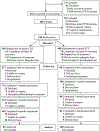A Randomized Controlled Trial of Group Cognitive Behavioral Treatment for Veterans Diagnosed With Chronic Posttraumatic Stress Disorder
- PMID: 30499227
- PMCID: PMC6295345
- DOI: 10.1002/jts.22338
A Randomized Controlled Trial of Group Cognitive Behavioral Treatment for Veterans Diagnosed With Chronic Posttraumatic Stress Disorder
Abstract
Relative to advances in the literature that have examined individual treatment approaches for posttraumatic stress disorder (PTSD), scientific knowledge about group treatment approaches has lagged, resulting in no currently available group treatment for PTSD despite the frequency with which this format is used. Our goal was to build upon the existing literature by examining the efficacy of a group cognitive-behavioral treatment (GCBT) for PTSD relative to group present-centered treatment (GPCT). The sample consisted of 198 male veterans with PTSD who were recruited at two Department of Veteran Affairs medical centers and randomly assigned to either GCBT (n = 98) or GPCT (n = 100); both treatments were 14 sessions. Assessments occurred at baseline, midtreatment, posttreatment, and 3-, 6-, and 12-month follow-ups. Findings indicated significant reductions in PTSD severity and PTSD diagnostic status following treatment for both GCBT, d = 0.97, and GPCT, d = 0.61. In addition, we observed significant reductions for depression symptoms, anxiety symptoms, and functional impairment for both group treatments as well as a reduction in the percentage of veteran participants who met diagnostic status for co-occurring major depression disorder and generalized anxiety disorder. Notably, these treatment gains were maintained at 12-month follow-up. Contrary to expectations, there were no significant differences between treatment conditions. Veterans diagnosed with PTSD were successfully treated using a group approach. Consistent with a growing body of evidence, the findings also suggest GPCT is as equally efficacious as group trauma-focused treatment. The trial was registered at clinicaltrials.gov (NCT01544088).
Published 2018. This article is a U.S. Government work and is in the public domain in the USA.
Figures
References
-
- American Psychiatric Association (2013). Diagnostic and Statistical Manual of Mental Disorders (5th ed.). Washington, DC: American Psychiatric Association.
-
- Baldwin SA, Murray DM, & Shadish WR (2005). Empirically supported treatments or type I errors? Problems with the analysis of data from group-administered treatments. Journal of Consulting and Clinical Psychology, 73, 924–935. https://doi.org/10.1037/0022-006x.73.5.924 - DOI - PubMed
-
- Beck JG, & Coffey SF (2005). Group cognitive behavioral treatment for PTSD: Treatment of motor vehicle accident survivors. Cognitive and Behavioral Practice, 12, 267–277. https://doi.org/10.1016/S1077-7229(05)80049-5 - DOI - PMC - PubMed
-
- Beck JG, Coffey SF, Foy DW, Keane TM, & Blanchard EB (2009). Group Cognitive Behavior Therapy for Posttraumatic Stress Disorder: An initial randomized pilot study. Behavior Therapy, 40, 82–92. https://doi.org/10.1016/j.beth.2008.01.003 - DOI - PubMed
-
- Beck AT, Epstein N, Brown G, & Steer RA (1988). An inventory for measuring clinical anxiety: Psychometric properties. Journal of Consulting and Clinical Psychology, 56, 893–897. https://doi.org/10.1037/0022-006X.56.6.893 - DOI - PubMed
Publication types
MeSH terms
Associated data
Grants and funding
LinkOut - more resources
Full Text Sources
Medical
Miscellaneous


